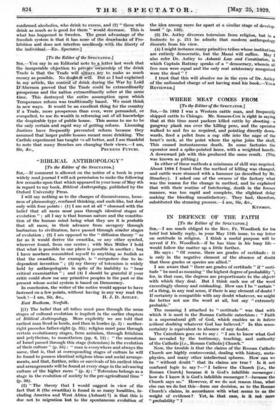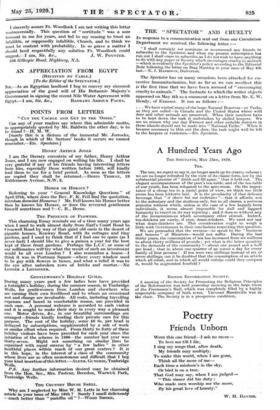IN DEFENCE OF THE FAITH
[To the Editor of the SPECTATOR.]
Sut,—I am much obliged to the Rev, Fr. Woodlock for his brief but kindly reply, in your May 11th issue, to my letter on certitude in religion. I think a useful purpose will be served if Fr. Woodlock—if he has time in his busy life— would follow the matter up a little further.
He says : " Of course, there are grades of certitude : it is only in the negative element of the absence of doubt that these grades or species are allied."
I am aware that " there are grades of certitude " if " certi- tude " be used as meaning " the highest degree of probability "; for, in that case, the degrees are proportionate to the objects with which they deal. But I think such use of the word exceedingly clumsy and misleading. How can I be " certain " of a thing, in any real sense, if there is any element of doubt ? If certainty is compatible with any doubt whatever, we might far better not use the word at all, but say " extremely probable."
The meaning I attached to " certitude " was that with which it is used in the Roman Catholic catechism : " Faith is a supernatural gift of God, which enables us to believe without doubting whatever God has believed." In this sense, certainty is equivalent to absence of any doubt.
The Catechism goes on to say : " I am to know what God has revealed by the testimony, teaching, and authority of the Catholic [i.e., Roman Catholic] Church."
Now, the trouble is that the claims of the Roman Catholic Church are highly controversial, dealing with history, meta- physics, and many other intellectual spheres. How can we be " without doubt " that its claims are true ? Is it not confused logic to say ?—" I believe the Church [i.e., the Roman Church] because it is God's infallible messenger ; how do I know it is God's infallible messenger ?—because the Church says so." However, if we do not reason thus, what else can we do but this—form our decision, as to the Roman Church's claims, in accordance with what seems to us the weight of evidence ? Yet, in that ease, is it not mere " probability " ? I sincerely assure Fr. Woodlock I am not writing this letter controversially. This question of " certitude" was a sore torment to me for years, and led to my ceasing to trust -an infallible, or supposedly infallible, Church, and to think we must be content with probability. In so grave a matter I should heed respectfully any solution Fr. Woodlock could









































 Previous page
Previous page